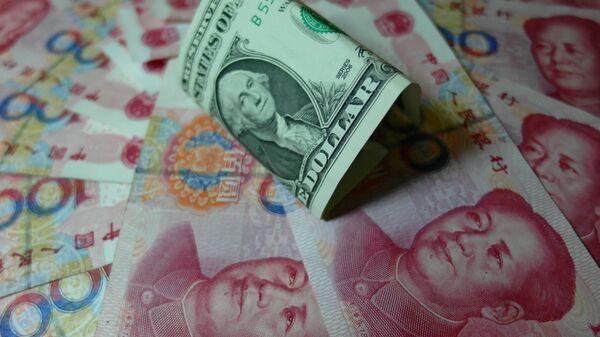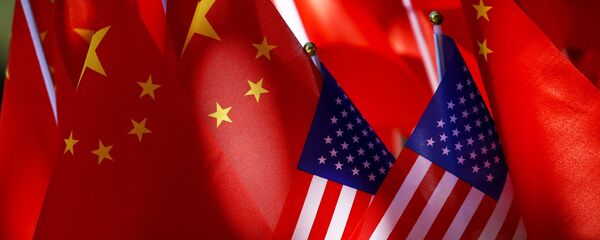Experts believe that China has already started testing this option in recent months. According to data from the US Department of the Treasury, Beijing sold $20 billion in US government debt in March alone.
Claude Barfield, a former consultant to the office of the US Trade Representative and an international trade specialist, explained what consequences are possible for both parties if China decides to use US Treasuries as a weapon in the trade war between the nations.
Even though China often denies plans to sell its US Treasuries, this scenario is periodically discussed by experts and the mainstream media. In your opinion, how possible is this development, amid the current trade wars?
The United States Treasuries are quite secure, and what are they going to do with it? So they would face and the rest of the world would face at least short-term disruption. The United States also has other countries that have investments in US Treasuries, so ultimately I think the United States will be hurt initially, but there would not be any kind of body blow to the United States.
READ MORE: Pentagon Working on Reducing US Reliance on Chinese Rare Earth Minerals
How would this, if it happens, affect the state of the US Treasuries and global financial markets in general?
Claude Barfield: As I've said, I think there would certainly be an initial disruption, but I think the US Treasuries are strong and there are many others are who are perfectly willing to invest in US Treasuries, so I think that would be a brief disruption, it might be sharp, at least initially, if it came as a surprise, but I don't think it would be ultimately really deeply disruptive to the United States economy.
I think you would also have multilateral institutions like the World Bank and the IMF would undoubtedly do whatever they needed to do to stabilise the world economy or the world markets.
What countries might be interested in holding part of the US debt in the near future?
Claude Barfield: The countries that hold it now. I wouldn't know specifically, but it could be a developed country, it could be any of the European countries, if you are a developing country and you want to invest your money in safe security, the United States is still one of the safest securities in the world.
It would be hard to say, it would depend on the needs of a particular country, whether it's Brazil, or France, or Germany, or Japan, whoever, but I don't think that anything that the Chinese did would have a long-term impact on the decision to invest in US securities.
READ MORE: China Dismisses US Warnings on Breaching Iranian Sanctions
During the election campaign in 2016, Donald Trump claimed that he would solve the national debt problem in two presidential terms. However, during his presidency, the size of the debt has increased by more than $ 2 trillion. What are your predictions about the situation with the US national debt? Will Trump fulfil the promise?
Claude Barfield: Well it's certainly going to continue to go up, given the fact that we're spending more than we draw in, and we have a big tax cut, one can debate the positive parts of the tax cut, but it's certainly going to have a negative impact on the Treasury, and Trump's boasts in 2016 it was, in fact, a lie, and he probably knew it was a lie, but it was a part of the campaign.
Trump also stated that the increase in import tariffs will allow Washington to reduce its debt. What role do tariffs actually play in influencing the level of the US debt?
If you wanted to buy a toy or a piece of furniture from China and you don't have a lot of money and it goes up 10-15% and it means a lot to you, maybe not for a more well-to-do person or a business, but it does have a negative impact on the US economy.
READ MORE: Bannon Urges Trump to Continue Pressure on China with Tariffs
Recently, China introduced new tariffs on exports from the US. In response to this, the US began to eradicate Huawei from the smartphone market by compelling companies such as Google to stop doing business with them. What could be the US response be in the case that China sells its Treasuries? How much could it affect the Chinese economy?
Claude Barfield: I think the Chinese need to be careful because it would be disruptive to their own [economy], where are they going to put the money? They also would be impacted by the negative short-term impact on the world economy and the world financial economy, at any rate. So they'd be shooting themselves in the foot if they did something like this.
So that's why you haven't really seen a lot of discussions about this in Chinese government circles, a lot of analysts have speculated about it, but the Chinese government has never indicated that it's something that it's thinking about or would think about.
READ MORE: Euro is Killing Economies, Social Structures & Jobs in EU States — UK Economist
How will the trade war between the US and China develop in the near future, in your view?
Claude Barfield: That's hard to know. I think it's likely that everything we see now it's likely to extend. There was hope that at the G20 they might have some resolution, but I don't think anybody thinks that's possible now.
I also think it's just going to extend out and Trump has put off some of the tariffs and he may go for a big bang of tariffs, he may institute tariffs gradually, an increase of beyond what he's got, but we'll just have to wait and see, but I don't really see an ending right now.
And in your opinion, could the US and China somehow arrive at a consensus during the G20 summit?
Views and opinions, expressed in the article are those of Claude Barfield and do not necessarily reflect those of Sputnik.






